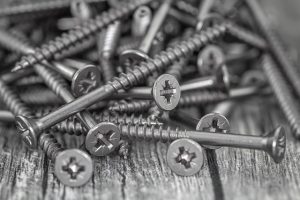
Screws are easily driven into soft materials like wood, but unfortunately they don’t always stay there. Over time, they may come loose. A screw may gradually work its way out of the pilot hole in which it was originally driven. The good news is that there are several steps you can take to prevent screws from coming loose in wood.
Wood Screws
Some screws are better suited for wood than others. There are “wood screws,” for instance, that are designed for fastening applications involving wood. They are available in many of the same materials as other screws — stainless steel, brass, titanium, etc. — but they feature coarse threads with a partially threaded shank. This allows them to grip wooden workpieces better than most other types of screws.
The Right Length
Don’t make the mistake of using an excessively short or long screw. If the screw is too short, it may not provide sufficient hold. If it’s too long, on the other hand, it may split the wood during installation. Choose a screw in an appropriate length for your fastening application.
Pilot Hole
Rather than trying to drive screws directly into wood, drill a pilot first. Pre-drilling a pilot hole will lower the risk of the screw coming loose. Just remember to make the pilot hole slightly smaller in diameter than the screw. As you drive the screw into the wood, the pilot hole will enlarge.
Lock Nuts
You can use lock nuts to secure screws in wood. Also known as self-locking nuts, lock nuts are designed to resist vibrations.
There are two primary types of lock nuts: prevailing and free-spining. Prevailing lock nuts work by deforming when tightened. Free-spinning lock nuts do not require extra torque, making them easier to install.
Thread-Locking Fluid
Another tip to prevent screws from coming loose in wood is to use thread-locking fluid. Thread-locking fluid consists of compounds that harden around the threads of a screw. You can apply a small amount to the threads of a screw immediately before installation. After driving the screw into wood, the fluid will harden to create a stronger and more secure hold.
Washer
If you’re worried about a screw coming loose, install it with a washer. Washers are designed to distribute the load of threaded fasteners. Without a washer, the load of the screw may crack the surface of the wood. The screw will then have an easier time coming loose. A washer can prevent this from happening by distributing the screw’s load over a greater surface area.
